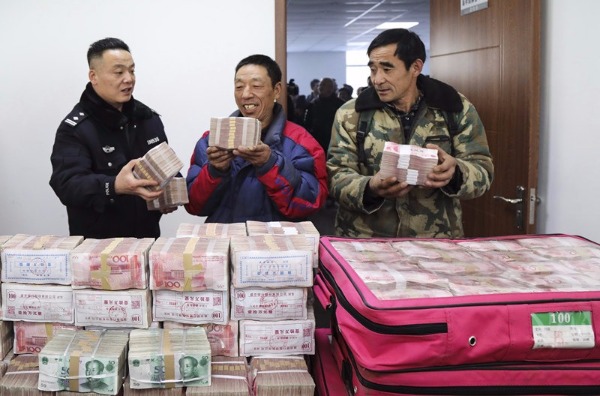Beijing prioritizes migrants' wages
By Cui Jia | China Daily | Updated: 2019-10-31 09:21

China plans to root out the issue of employers who intentionally delay paying wages to migrant workers, an official of the Ministry of Human Resources and Social Security said on Wednesday.
"The migrant workers and their families depend solely on their hard-earned money, so they become very desperate when they aren't paid on time and in full," Wang Cheng, director of the ministry's labor and social security supervision department, said at a news conference.
"So delaying wages of migrant workers with malicious intent is a serious matter affecting people's livelihood and social stability."
Wang is also the deputy head of the leading group set up in August by the State Council to tackle the issue through coordinating law enforcement.
In 2011, China's lawmakers added the punishment for maliciously delaying employees' wages into the Criminal Law.
Since then, the Ministry of Human Resources and Social Security, the Ministry of Public Security, the Supreme People's Procuratorate and the Supreme People's Court have prioritized such cases, Wang said.
The percentage of migrant workers who failed to receive wages on time or at all dropped to 0.6 in 2018 from 4.1 in 2008, according to the National Bureau of Statistics.
"Also, the number of mass incidents involving migrant workers demanding wages, and the number of people participating in such incidents before the Spring Festival, have both dropped significantly in recent years," he said at the news conference held by the State Council Information Office in Beijing.
From May 2011 to September, 7,674 people were sentenced to imprisonment or criminal detention for intentionally not paying employees. Among them, 116 people received prison sentences of over three years. The maximum penalty for such a crime is seven years, said Zhou Jiahai, head of the research office with the Supreme People's Court.
According to the National Bureau of Statistics, there are 288 million migrant workers in China who choose to leave their homes in rural areas to work in cities, and the number is still rising.
Due to unregulated development since the opening-up of China, the construction industry is traditionally where the majority of the cases occur.
This year, the leading group also decided to add enterprises specializing in foreign trade to the high-risk list, Wang said.
"The trade war between China and the United States has affected the production of some foreign trade enterprises, so we are closely monitoring the operation of those enterprises to ensure the migrant workers there can get paid," he added.
























